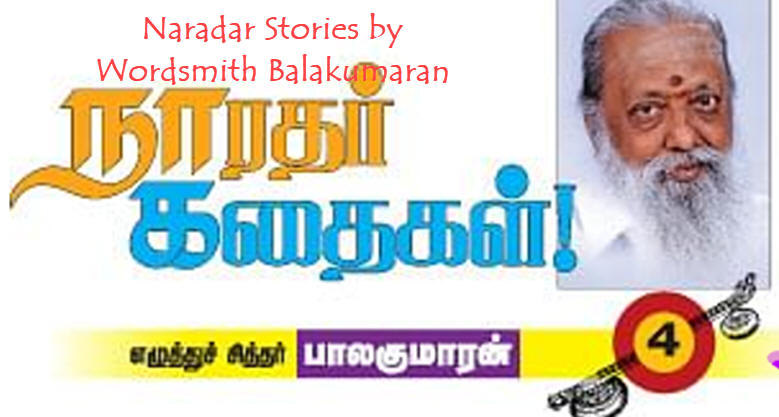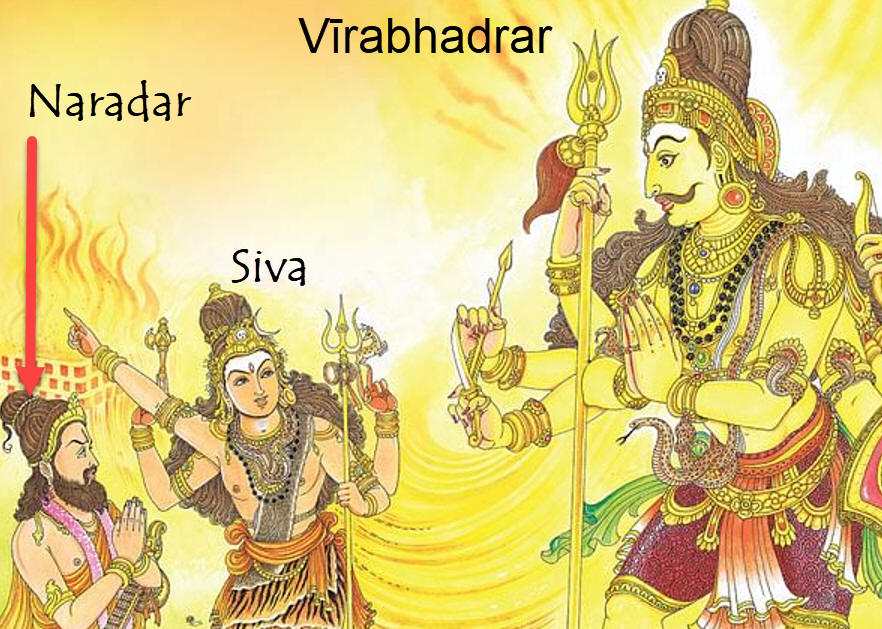Published:27 May 2013 8 PMUpdated:27 May 2013 8 PM Sakthi Vikatan
Vikatan Correspondent
This is the essence of four Vedas.

You are making a mistake. Demanding to extend an invitation from your father is damaging to your self-respect. Don't you know the consequences? Devi! What happened to you? It is a disgrace to go to a place without being invited, which will only increase his Ahaṅkāram. Would your father not crow over the possibility you and your near and dear will show up without an invitation? "
NaradarStories04
2. Devi! Your father planned this insult. What kind of clarity do you want to bring to his thinking? Dear consort! I will not go to a place where you receive no respect. You must listen. More importantly, husband-wife amity is better than that of father and daughter. The couple is one (Remember Ardhanarīsvara), inseparable and indivisible. Are you going to impress him with the highest sanctity of a marital relationship? Would he understand it?
3. The world knows this is a planned vengeance and is unhappy about it, but they cannot disregard his invitation. I have no right to tell them not to go.
4. I will not tell them so. But when you say you want to go, I feel like saying, you must think hard before you go. Who Dakṣa insults, is not Śiva as an individual or his spouse, Dākṣāyiṉi? He insists on his right as a father to interfere in the relationship between a husband and his wife. No one, including the children, other female relatives, and not even God, can interfere in the husband-wife relationship. The next moment after the wedding, the husband takes the wife under his protection and custody. Your father's Ahaṅkāram (ego) is craving to come between that husband-wife relationship; it is disgusting. I look at Dakṣa not in anger but with disgust. It is better to avoid an appalling person than to follow him from behind, with no self-respect. The latter will worsen his Ahaṅkāram and our contempt. Dākṣāyiṉi! It would help if you thought deep. Śiva was soft in his voice while advising Dākṣāyiṉi.
5. Dakṣa knows one skill well to be on the top; based on it; he thinks he could talk about all matters, reach conclusions, and attained competence. This specious nature provokes disgust. Since Tapas brought him boons, he caused distress and agitation in Devas. How could I (Śiva) celebrate Dakṣa? In consideration of these facts, you should not go. If you think you will advise him, you may go. You may visit with your father. You do not even need my permission to visit with him. Since you asked me, I permit you. You may go and come back.

7. One obstinacy nurtures another stubbornness. Counter-obstinacy is worse than the present determination and induces more anger. Dakṣa's intransigence is an invitation to destruction. Nāradar saw this.
8. Dakṣa: "You are not my daughter. I did not give you away in marriage to Śiva with fire as the witness. You moved away from me to do Tapas and brought an ash-smeared puruṣa to be your husband. How does that amount to the respect of my daughter to me? Your disrespect has sown seeds for my disrespect to your husband. The blame lies squarely on you. I cannot celebrate a beggar you brought as your husband. He is not by any stretch the ideal husband I wanted for you. He is not your equal and does not deserve you. That brings distress and humility to me. It does not make me feel compassion for you."
9. "I am not your father and you are not my daughter from the moment you did not listen to me, abandoned me, and considered your husband more important than I am. Since you are my flesh and blood, you may stay for dinner and then leave. I cannot let your husband come in; He is not invited. "Dakṣa crowed his opposition to his daughter.
10. Daksāyini felt the pain in her heart and was wildly angry. She said, "Let the fire sacrifice come to a ruin, where there is no place for my husband. I will destroy this place, where you sprinkle the waters from the nearby river for purification, you invited eminent people, and you recite purifying Mantras. If I enter fire in this place and kill myself, the sanctity and purity of this place will be nil. Would it not besmirch the fire sacrifice? Saying thus, Dakṣāyini raised the internal fire in her body, succumbing to and dying from the fire.
11. Death caused by grief is consequential and will destroy a place, a sacrifice, and a house. Where one died from mental agony, that place will not blossom again. The dead person's memory will haunt the site forever. Dakṣa's fire sacrifice was defective and incomplete.
12. Burt Dakṣa did not give up. To repurify the place, he doubled up his efforts at a fast pace. Nāradar was astonished. Dakṣāyini's self-immolation surprised and shocked him.
The final deluge was near at hand, he felt.

14. Śiva listened to Nāradar as if heard it for the first time, pulled a braid of hair from his head, and angrily threw it on the floor. A colossal figure appeared, and its name was Vīrabhadrar. Nāradar paid homage to him.
15. Śiva address the Vīrabhadrar saying, "Go now, destroy Dakṣa's Fire sacrifice and return to me. I am hesitant to go there to punish him and feel disgusted to face him. You go, destroy Dakṣa and kill them all."
16. Vīrabhadrar went there and destroyed the sacrificial area into pieces. He chased Dakṣa all over the place, beat and killed him, beheaded all the attendees, and mutilated their bodies. The sacrificial hall was in ruins.
17. Nāradar inquired, "What is next?" He saw Śiva with grief and said, "Vīrabhadrar killed them all." Śiva with grace and compassion, resurrected all the dead people and healed all their injuries, and they were all their original selves. Dakṣa was missing. His arrogance and life died there.
18. Śiva closed his eyes, thought of his consort, later went away in grief to perform Tapas. Nāradar circumambulated Śiva and supplicated to Vaikuntavāsan (Viṣṇu) to make his Tapas fructify.
19. Husband-wife relationship is a wonderful matter and a great sakthi, which can be constructive or destructive. We can interpret Śiva-Dakṣāyini argument in a thousand ways, which serves as a lesson to earthly couples. It was a play of love against ego.
20. The wife suffered the indignity extended to her husband and died. Śiva rose in anger and pulverized the object of his rage, which is love on a firm foundation. Though even God cannot come between a husband and wife, death is a matter of togetherness.
21. Nāradar had been thinking of this event for a long time. Here Nāradar's tears induced Śiva and caused destruction.